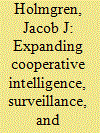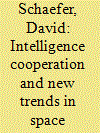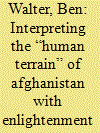| Srl | Item |
| 1 |
ID:
182057


|
|
|
|
|
| Summary/Abstract |
Throughout its history, the United States of America has relied on extensive
cooperation with allies and partners to compete with and, when necessary,
defeat adversaries. Australian and American forces worked closely in concert during World War II to find and destroy enemy air and naval forces, perhaps
most famously through the utilization of Australian national and indigenous
Coastwatchers throughout the Solomon Islands and Papua New Guinea. This arc
of history continues today, especially on the Korean Peninsula, where US and
Republic of Korea (ROK) intelligence, surveillance, and reconnaissance (ISR) assets work together to maintain 24-hour-a-day eyes and ears on North Korea.
Although the United States has a rich history and strong current relationship
with partners and allies regarding ISR, the future challenges of the region will
require even closer cooperation. The decision advantage that ISR provides can be
the deciding factor in success or failure.
|
|
|
|
|
|
|
|
|
|
|
|
|
|
|
|
| 2 |
ID:
160464


|
|
|
|
|
| Summary/Abstract |
For the first time since the 1970s, Canberra cannot assume the joint facilities will continue to underpin the Australia–US alliance. Intelligence cooperation via outer space, described as the ‘strategic essence’ of this relationship, is poised for transformation. New technologies are being developed for satellite communication, with laser systems capable of bypassing ground control stations outside US territory. As a result, the one indispensable role for Australia in US national security—hosting infrastructure to relay intelligence about nuclear and missile activity—could become irrelevant in the years ahead. With questions raised about the Trump administration’s commitment to security partners and the risk of US disengagement from Asia, these findings have implications for Australian alliance diplomacy. If intelligence ties bind these countries together at present, Canberra can expect some risk of loosening in the future and will need to think carefully about the development of national intelligence resources over the long term.
|
|
|
|
|
|
|
|
|
|
|
|
|
|
|
|
| 3 |
ID:
156640


|
|
|
|
|
| Summary/Abstract |
In this paper I advance the proposition that Western policymakers’ perceptions and understandings of the conflict in Afghanistan are heavily influenced by certain political ideas emerging from seventeenth-century Enlightenment philosophy. This is particularly evident with counterinsurgency practitioners’ usage of social science disciplines to produce “objective” information about the local societies with which they are engaged. However, Enlightenment-inspired principles constrict practitioners’ perceptions of politics and political conflicts. These shortcomings are illustrated in both the form and content of policymakers’ efforts to gain “human intelligence” about Afghanistan’s social composition, and in the re-emergence of “human terrain” discourse. This blinkered viewpoint has left counterinsurgency practitioners unable to understand the United States’ own role in fueling Afghanistan’s conflictual dynamics.
|
|
|
|
|
|
|
|
|
|
|
|
|
|
|
|